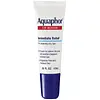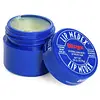What's inside
What's inside
 Key Ingredients
Key Ingredients

No key ingredients
 Benefits
Benefits

 Concerns
Concerns

 Ingredients Side-by-side
Ingredients Side-by-side

Octyldodecanol
EmollientC18-38 Alkyl Hydroxystearoyl Stearate
EmollientRicinus Communis Seed Oil
MaskingCaprylic/Capric Triglyceride
MaskingGlycerin
HumectantPanthenol
Skin ConditioningBis-Diglyceryl Polyacyladipate-2
EmollientWater
Skin ConditioningPolyglyceryl-3 Diisostearate
EmulsifyingButyrospermum Parkii Butter
Skin ConditioningHydrogenated Castor Oil
EmollientTocopherol
AntioxidantTocopheryl Acetate
AntioxidantSodium Ascorbyl Phosphate
AntioxidantBisabolol
MaskingBeeswax
Emulsion StabilisingC20-40 Alkyl Stearate
Skin ConditioningMagnesium Stearate
Cosmetic ColorantMagnesium Sulfate
Octyldodecanol, C18-38 Alkyl Hydroxystearoyl Stearate, Ricinus Communis Seed Oil, Caprylic/Capric Triglyceride, Glycerin, Panthenol, Bis-Diglyceryl Polyacyladipate-2, Water, Polyglyceryl-3 Diisostearate, Butyrospermum Parkii Butter, Hydrogenated Castor Oil, Tocopherol, Tocopheryl Acetate, Sodium Ascorbyl Phosphate, Bisabolol, Beeswax, C20-40 Alkyl Stearate, Magnesium Stearate, Magnesium Sulfate
Camphor 1%
MaskingMenthol 1%
MaskingPetrolatum 59.14%
EmollientPhenol 0.54%
AntimicrobialBeeswax
Emulsion StabilisingBenzyl Alcohol
PerfumingDiisopropyl Adipate
EmollientAroma
Parfum
MaskingLanolin
EmollientMenthoxypropanediol
MaskingMicrocrystalline Wax
Emulsion StabilisingMyristyl Myristate
EmollientRicinus Communis Seed Oil
MaskingSaccharin
MaskingTheobroma Cacao Seed Butter
Emollient
 Reviews
Reviews

Ingredients Explained
These ingredients are found in both products.
Ingredients higher up in an ingredient list are typically present in a larger amount.
Beeswax is natural wax produced by honey bees and can be synthetically created. It consists mainly of fatty acid esters and long-chain alcohols.
In cosmetics, beeswax is a emollient. Due to its waxy structure, it creates a protective barrier. This barrier prevents water from evaporating off the skin.
This may not be a good ingredient for oily skin. We recommend speaking with a professional if you have concerns.
Beeswax cannot be removed with water, but can be taken off with an oil cleanser.
Beeswax is also antiseptic and contains vitamin A.
Learn more about BeeswaxRicinus Communis Seed Oil is the INCI name for castor oil.
Castor Oil helps moisturize the skin. It is rich in a fatty acid called ricinoleic acid. This fatty acid helps prevent moisture loss on the skin. This helps keep your skin soft and hydrated. Ricinoleic acid also has anti-inflammatory and pain reducing properties.
Besides hydrating the skin, castor oil is also used to hydrate hair. By keeping the hair shaft moisturized, breakage is decreased. More studies are needed to show castor oil's effective on stimulating hair growth.
Castor oil is created by cold-pressing castor seeds and then purifying the oil with heat. It was used in Ancient Egypt as fuel in lamps and to help treat eye irritation.
The term 'fragrance' is not regulated in many countries. In many cases, it is up to the brand to define this term. For instance, many brands choose to label themselves as "fragrance-free" because they are not using synthetic fragrances. However, their products may still contain ingredients such as essential oils that are considered a fragrance.
Learn more about Ricinus Communis Seed Oil